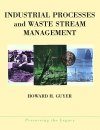About this book
INDUSTRIAL PROCESSES and WASTE STREAM MANAGEMENT This book provides environmental technology students with a quick, enjoyable way to master the knowledge and skills needed to develop and implement successful, cost-effective industrial pollution control programs, especially when used in coordination with the Industrial Processes and Waste Stream Management video series produced by INTELECOM Intelligent Telecommunications. The first section of the book lays the conceptual foundations with a detailed overview of waste stream management tools and regulations and the four EPA-approved treatment methods: physical, chemical, thermal, and biological. The following 20 chapters are organized by industry, and provide a fascinating case-by-case exploration of industrial processes and how the waste streams they generate are managed in all major industries, including petroleum, chemicals, mining, metals, paint, textiles, agriculture, paper, printing, nuclear, medical, and more. Features that make Industrial Processes and Waste Stream Management an ideal introduction to the subject for environmental technology students, include: * Acclaimed, user-friendly, modular format found in all the books in the Preserving the Legacy series * Basic anatomy, physiology, and chemistry concepts that help clarify how toxins interact with living tissue * Proven, rapid-learning modular format-each chapter features learning objectives, topic summaries, chapter-end reviews, and practice questions * Helpful sidebars that highlight critical concepts * More than 175 high-quality line drawings, photographs, diagrams, charts, and tables * Numerous easy-to-perform, skill-building classroom activities * A glossary of more than 1,000 essential terms * Extensive bibliography of recommended readings in all key subject areas Industrial Processes and Waste Stream Management is also an excellent refresher/quick-reference guide for practicing environmental technicians.
Contents
Introduction to Waste Streams. Waste Stream Regulations. Physical Treatment Technologies. Chemical Treatment Technologies. Thermal Treatment Technologies. Biological Treatment Technologies. Minimization of Waste and Pollution Prevention. Life Cycle Design for General Manufacturing. Hazardous Waste Regulations for the Cleanup Industries. The Petroleum Industry. The Chemical Production Industries. The Mining Industries. The Metal Production Industries. The Metalworking Industries. The Electroplating and Metal Finishing Industries. The Paint and Surface Coating Industries. Integrated Circuits and Electronics Assembly Industries. The Painted Wiring Board Industries. The Pulp and Paper Industries. The Graphics and Printing Industries. The Textile Industries. The Agricultural Industries. The Food and Beverage Industries. The Furniture Finishing Industries. The Wood Preservation Industries. The Medical Industries. The Nuclear Industries. Consumer--Related Waste Issues. Glossary. Acknowledgments. Bibliography. Index.
Customer Reviews
Biography
HOWARD H. GUYER, PhD, is Academic Team Leader of the Preserving the Legacy National Academic Council. He served as chair of the Partnership for Environmental Technology Education (PETE) National Curriculum Study Group, the predecessor of the National Academic Council, from its inception in early 1992. Mr. Guyer received his MA in science education from Ohio State University in 1964. He has been a member of the Chemistry Department at Fullerton College for the past 31 years, where he has served as the Chemistry and Environmental Technology Department Chair for the past four years. In 1989, he helped to form a consortium of seven other faculty members and industry experts to develop the Environmental Technology Certificate and Associate Degree program for the California Community Colleges. From January 1991, and for the next three years, Mr. Guyer also served as the Environmental Technology Coordinator for the State Chancellor's Office. Under his leadership, the program expanded from its original eight to twenty--nine of the California community colleges. Mr. Guyer also served as the California Community College Representative on the Western PETE Board of Directors from its start in 1991 until 1995. He is currently serving as board member on the National PETE Board of Directors.


































